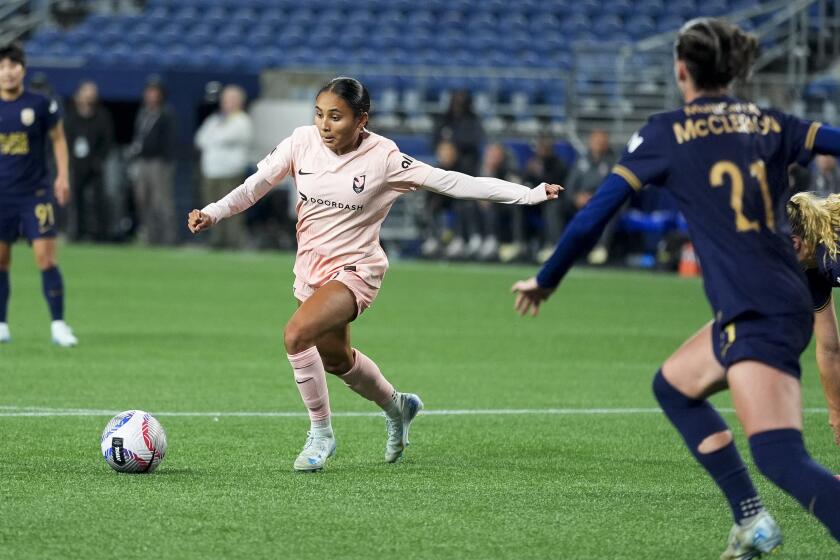A Kick Save
- Share via
There is no disputing the publicity lift soccer has received in the United States, thanks to the World Cup.
What can be done to sustain that boost--provided largely by the U.S.-Mexico match in the round of 16 this morning--is a subject for debate.
“The World Cup can only help accelerate the popularity here, but there is still an evolutionary process in place and more time is needed before soccer is ingrained as part of our culture,” Galaxy Coach Sigi Schmid said.
Schmid’s point is blunt commentary from an enthusiast.
He is riveted to the U.S. games, and not only because one of his players, Cobi Jones, is participating. He finds the action compelling because he grew up kicking a ball daily and has been an avid follower of the U.S. players’ progression through the years.
“Our talent’s growing and what’s being shown in the World Cup, like in the win against Portugal, is that we can compete on the international stage,” Schmid said. “Physically, we can hold our own--in fitness, power, strength and speed. We’ve also improved tactically and technically. The players are more aware of game situations, because they’ve played under more pressure situations.”
If Schmid had his way, he’d wax eloquently about the World Cup beauty of crossing passes, backspin touches and the importance of the dogged pursuit of a ball kicked free near midfield.
He’ll save it for Soccer Digest. Schmid understands the typical U.S. sports fan isn’t so enthusiastic about all the finer details.
“We can continue to push our fans, though, and the World Cup has proved to them we are on par,” Schmid said.
Galaxy defender Alexi Lalas said the World Cup matches represent the best education possible for casual sports fans in this country who might correlate soccer with the 8-5 game their 10-year-old child played Saturday at the neighborhood park.
“The more quality, high-level soccer like World Cup we have on television, the better our perception becomes,” Lalas said.
Lalas said perception becomes knowledge and knowledge becomes a stronger fan base.
“Every four years, an opportunity comes along for our sport and we either grab it, like we did in 1994, or we don’t, like in ‘98, when we had a bunch of bad press for not doing so well,” Lalas said. “A star can be created in World Cup. I’ve lived that, and it’s a wonderful thing. But it doesn’t fill stadiums and what we need to clearly understand is that a domestic league like MLS isn’t the World Cup and a city’s team is not a nation’s team.”
It’s the job of a Major League Soccer executive such as Galaxy General Manager Doug Hamilton to bridge the gap.
Hamilton helped arrange a Sunday night gathering of Galaxy season-ticket holders and sponsors to watch U.S.-Mexico at Staples Center’s Grand Reserve Club.
“We want it known that there are more MLS players participating in the World Cup than from any South American professional league, even Argentina’s,” Hamilton said.
He also wants it known that the Galaxy and Jones will be home to play the San Jose Earthquakes and World Cup members Landon Donovan and Jeff Agoos on July 4 at the Rose Bowl.
With an uncertain expiration date for U.S. World Cup participation, consultants spent last week urging MLS and U.S. Soccer Federation executives to act strongly and quickly to install major marketing projects that hype the players.
Sponsorship industry executives told soccer leaders at a Friday Sports Business Daily round table discussion that a U.S. trip to the semifinals or finals would result in a noticeable increase in consumption of soccer-related items by “casual soccer fans and sports fans in general.”
No matter what the outcome, Hamilton said, he is prepared to continue the buzz.
“Cobi Jones has been marketable for years, and we continue to want to parade him around as much as we can,” Hamilton said. “Now, there are so many others, like Donovan, who can make a match against San Jose a marquee event on our schedule.”
Player agents are expected to push for advertising deals with several companies, perhaps the most likely ones to include MLS and Galaxy supporters such as Nike, Pepsi and McDonald’s.
“The MLS needs to look at the World Cup as a partner and promote the game itself to soccer people,” said Rick Davis, a member of the National Soccer Hall of Fame and a Galaxy broadcaster. “It makes sense: Sell the game to people who participate. That’s a huge population.”
Davis said other attractive ideas include a possible U.S. soccer team post-World Cup tour and increased public appearances by MLS players.
“The game has a strong pulse in our society right now,” Davis said. “There’s no time to sit back.”







